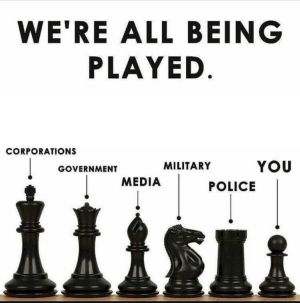The Society/Chess Metaphor
The Core Metaphor: Society as a Manipulated Game
The image presents society not as a collaborative endeavor or a space of genuine freedom, but as a strategic game – specifically, chess. The overarching message, "WE'RE ALL BEING PLAYED," suggests that the rules, movements, and ultimate goals are dictated by unseen players or inherent systemic forces, benefiting a select few pieces at the expense of others. This invokes philosophies critical of existing power structures, suggesting that individual lives and societal institutions are mere instruments within a larger, often opaque, contest for dominance.
Hierarchy of Power and Function:
The specific pieces assigned represent a clear hierarchy mirroring perceived societal influence:
- King (Corporations): In chess, the King's survival is the ultimate goal, though its movement is limited. Assigning Corporations here suggests they are the central entity around which the "game" of modern society revolves. Their interests (profit, market control) are paramount, and other pieces often function to protect or advance them. Their power isn't necessarily in overt action (like the Queen) but in defining the objective of the game itself.
- Queen (Government): The most powerful piece in terms of movement and direct influence. This aligns with the Government's ability to enact laws, regulate, and exert authority across the board (society). However, in this depiction, the Queen often serves to protect the King (Corporations), suggesting governmental power is frequently wielded in service of corporate interests.
- Bishop (Media): Moves diagonally, cutting across the board along specific lines. This represents the Media's role in shaping narratives, influencing specific segments of society, and promoting particular ideologies or agendas ("angles") that often align with governmental or corporate powers.
- Knight (Military): Its unique, non-linear movement suggests the Military's ability to project power in less conventional ways, jumping over obstacles to exert force or influence strategically, often in defense of the state's (and by extension, the King/Queen's) interests.
- Rook (Police): Moves in straight lines, controlling ranks and files. This represents internal state power, enforcing laws, maintaining order within established boundaries, and protecting the existing structure and property – essentially controlling the space where the game unfolds.
The Pawn (YOU): The Average Consumer/Citizen
Assigning the average person ("YOU") to the Pawn is philosophically potent for several reasons:
- Numerosity and Perceived Value: Pawns are the most numerous pieces but individually the least powerful. This reflects the status of the average citizen or consumer – part of the vast majority, but often treated as having minimal individual influence or intrinsic value within the grander strategic game.
- Limited Agency and Movement: Pawns have highly restricted movement (typically one step forward, attacking diagonally). This symbolizes the limited agency and constrained choices faced by ordinary people within complex socio-economic and political systems. Life paths, career options, and consumption habits often feel predetermined or restricted to narrow channels.
- Expendability and Sacrifice: Pawns are routinely sacrificed in chess to gain a strategic advantage, protect more valuable pieces, or control territory. This is the most critical aspect: it suggests that the well-being, labor, privacy, and even lives of average people are often considered expendable resources ("human resources," "consumer data") sacrificed for corporate profit, government agendas, or military objectives. They are the front line, absorbing the first impacts of economic downturns, policy failures, or conflicts.
- Potential vs. Reality (Promotion): While a pawn can theoretically cross the board and be promoted to a more powerful piece (often a Queen), this is a difficult and relatively rare occurrence within the game. This mirrors the societal promise of upward mobility – while possible, the structure of the "game" makes it statistically unlikely for the vast majority of "pawns" to fundamentally alter their position or power level. The possibility serves as a legitimizing myth, while the reality for most is remaining a pawn.
- Lack of Awareness: The overarching message "WE'RE ALL BEING PLAYED" implies that the Pawn, more than any other piece, is often unaware of the larger game, its rules, or the forces manipulating its movements. They simply follow their limited path, unaware of how their actions serve the strategies of the more powerful pieces or the unseen players controlling them.
In essence, the image uses the chess metaphor to offer a critical philosophical perspective: modern society operates like a rigged game where powerful institutions (Corporations, Government, Media, Military, Police) function as strategic pieces, often serving hidden interests, while the average individual is relegated to the role of the expendable, manipulated Pawn, whose primary functions are to occupy space, absorb impact, and occasionally be sacrificed for the "greater good" as defined by the more powerful players.
